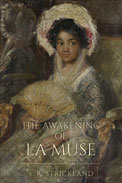
 |
A young slave girl living on a Virginia plantation encounters the new ideas of freedom when she is taken to Paris in the mid-1800s. Muse, whose African name is Aggrey (meaning “bead”) lives and works alongside her mother Mary, who has talents as a healer. When both Muse and her white mistress Cassandra contract a pox-like illness, Muse recovers more quickly owing to Mary’s ministrations, while Cassandra will retain scars on her face. While recuperating, Muse is left alone in a shack that adjoins the white children’s school. Though it is forbidden, she begins to learn to read and write and is later secretly assisted by the schoolmaster in perfecting those skills.
When Cassandra’s brother attempts to rape Muse and is caught and throttled by a fellow slave, the decision is made to take her along with Cassandra and her parents to Paris, France, where the family hopes to find Cassandra a husband. In that freshly growing, changing city, Muse ventures out stealthily to meet with Claire, an Irish/American nanny who befriended her while traveling in steerage. Claire and many others in the open atmosphere of a country that forbids slavery speak to Muse about emancipation and escape. When she hears that her owners may be forced to sell her to improve their finances, Muse, by now a self-trained seamstress, finally makes her move. However, she carries with her the memory of Jean-Paul, a handsome architect she met while performing duties as Cassandra’s personal maid, and he carries memories of her.
The author of this tightly constructed historical novel cites her own journey to Europe and the sense of independence and openness she felt while there as part of her impetus to tell the story of Muse. Strickland has clearly done careful research about Paris at the time of the story’s action, the city where Muse and Jean-Paul first meet one another and where Muse gradually gains a sense that a bid for freedom is not only possible but certain. The author possesses and conveys a high degree of sensitivity about the many layers of racism that can reveal themselves even among the most liberal-minded folk. She is also attuned to the atmosphere prevalent in France following its populist revolution, which engendered a powerful respect for liberty and equality for all people regardless of skin color or origin.
In the young Muse, Strickland has created a believable heroine who knows her own worth and pursues her own dreams, using her few opportunities for education greatly to her advantage. The narrative has a classic, literate feel, and at times waxes poetic: “on the night of a full moon, when sinister reflections gyrate against a stone wall”; “her mind scattered like puzzle pieces trying to come together as one unit but unable to find a match…” Yet amid these subtleties Strickland keeps the action moving as Muse must deal with a suitably vicious bounty hunter and a dashing, protective lover who can understand her because he, too, has battled prejudice and hate. Vibrant, exciting, sensitive, and with a central setting in one of the world’s most alluring cities at a crucial moment in history, Muse’s search for inner and external freedom has universal resonance and is certain to enchant readers and garner deserved attention for its talented creator.
RECOMMENDED by the US Review